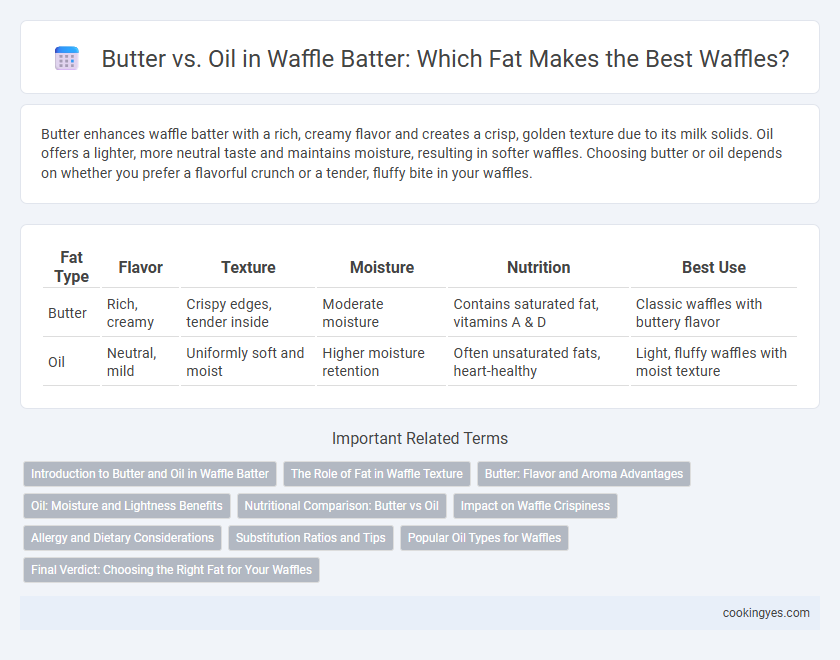Butter enhances waffle batter with a rich, creamy flavor and creates a crisp, golden texture due to its milk solids. Oil offers a lighter, more neutral taste and maintains moisture, resulting in softer waffles. Choosing butter or oil depends on whether you prefer a flavorful crunch or a tender, fluffy bite in your waffles.
Table of Comparison
| Fat Type | Flavor | Texture | Moisture | Nutrition | Best Use |
|---|---|---|---|---|---|
| Butter | Rich, creamy | Crispy edges, tender inside | Moderate moisture | Contains saturated fat, vitamins A & D | Classic waffles with buttery flavor |
| Oil | Neutral, mild | Uniformly soft and moist | Higher moisture retention | Often unsaturated fats, heart-healthy | Light, fluffy waffles with moist texture |
Introduction to Butter and Oil in Waffle Batter
Butter in waffle batter delivers rich flavor and a tender crumb due to its dairy fat content, enhancing the overall taste and texture. Oil provides a lighter, moister waffle with a crispier exterior because it remains liquid at room temperature, promoting even cooking. Choosing between butter and oil impacts batter consistency, mouthfeel, and the final waffle's golden-brown color.
The Role of Fat in Waffle Texture
Butter enhances waffle texture by incorporating water and milk solids that create steam during cooking, resulting in a lighter and crispier interior. Oil, with its pure fat composition, promotes a tender and moist crumb by coating flour proteins and limiting gluten formation. Choosing butter or oil distinctly influences waffle crispness, tenderness, and overall mouthfeel.
Butter: Flavor and Aroma Advantages
Butter enhances waffle batter with rich, creamy flavor and a distinctive aroma that oil lacks, intensifying the overall taste experience. The milk solids in butter contribute to a golden-brown crust through Maillard browning, adding appealing texture and enhanced visual appeal. Using butter in waffle batter delivers superior depth of flavor and a fragrant, inviting scent that elevates homemade waffles.
Oil: Moisture and Lightness Benefits
Using oil in waffle batter enhances moisture retention, resulting in a tender and soft texture that resists dryness even after cooling. Oil's liquid state at room temperature contributes to a lighter, fluffier waffle compared to butter's solid fat content. This moisture and lightness improve overall mouthfeel, making oil an ideal choice for waffle batter fat.
Nutritional Comparison: Butter vs Oil
Butter provides saturated fats and contains fat-soluble vitamins A, D, E, and K, which contribute to its richer flavor and nutritional profile in waffle batter. Oil, especially vegetable or canola oil, is typically higher in unsaturated fats, supporting heart health and lower cholesterol compared to butter. The choice between butter and oil affects calorie density and fat composition, influencing both the health impact and texture of waffles.
Impact on Waffle Crispiness
Butter in waffle batter enhances crispiness due to its milk solids that brown during cooking, creating a rich, golden crust and a distinctive flavor. Oil, having a higher fat content and no milk solids, helps retain moisture, resulting in a softer, less crispy texture. Choosing butter over oil significantly influences the final texture, with butter delivering a crisper waffle surface ideal for a traditional, crunchy bite.
Allergy and Dietary Considerations
Butter in waffle batter provides a rich flavor but may cause issues for those with dairy allergies or lactose intolerance, necessitating dairy-free alternatives. Oil, such as vegetable or coconut oil, offers a neutral taste and is often preferred for vegan or dairy-free diets, reducing allergen risks. Choosing between butter and oil depends on balancing flavor preferences with specific dietary restrictions and allergy concerns.
Substitution Ratios and Tips
Butter adds rich flavor and a tender crumb to waffle batter, while oil provides a lighter texture and crispier edges. When substituting oil for butter, use about 3/4 the amount of oil to butter (e.g., 3/4 cup oil for 1 cup butter) to maintain proper fat content. For butter substitutions, melt it before mixing and slightly reduce other liquids to compensate for its water content, ensuring optimal waffle consistency.
Popular Oil Types for Waffles
Popular oil types for waffle batter include vegetable oil, canola oil, and coconut oil, each contributing distinct flavors and textures. Vegetable oil offers a neutral taste that allows the waffle's sweetness to shine, while canola oil provides a light texture with a subtle buttery note. Coconut oil imparts a rich, slightly tropical flavor and yields a crispier waffle exterior.
Final Verdict: Choosing the Right Fat for Your Waffles
Butter enhances waffle flavor with a rich, creamy texture and contributes to a crisp golden exterior due to its milk solids. Oil provides a lighter, moister waffle with a tender crumb and better shelf-life because it stays liquid at room temperature. Selecting fat depends on desired texture and flavor: use butter for flavor and crunch, oil for softness and moisture.
Butter vs oil for waffle batter fat Infographic

 cookingyes.com
cookingyes.com